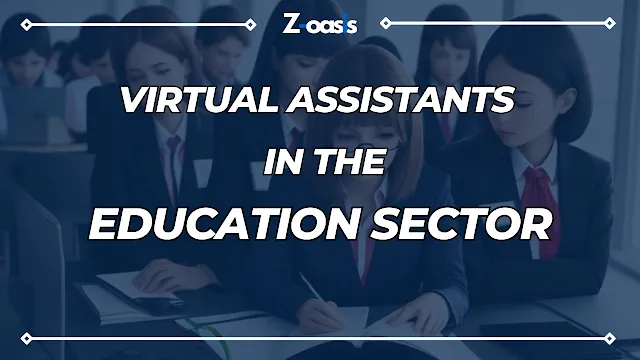No doubt, AI-powered virtual assistants have been making waves across different sectors, with education not left out of the mix. They've been designed to serve students and educators, adding extra value to learning by delivering personalized support. Let's look at the array of tasks these digital aides are up to - giving answers to questions, feedback provision, guidance, and even aiding communication. This post will shed more light on how virtual assistants function within education and the various advantages they bring to the table.
 |
| Virtual Assistants in the Education Sector |
Offering Personalized Support to Students
Virtual assistants act as digital tutors, providing students with customized assistance. These smart tools can tackle a host of queries, elucidate further on various subjects, and guide students through their academic journey. The good thing is that students can interact with these virtual assistants through either voice or text commands, making education accessible for everybody, irrespective of age or ability.
By simplifying intricate concepts or giving more examples, learners can better understand their course materials. They can also get timely feedback on their work, helping them to recognize areas that need development. Additionally, these virtual assistants could suggest a wealth of resources for continued learning. Gallantly providing instant and individualized support, these AI tools are driving learners to take the reins of their academics and learn at their pace.
Virtual Assistants: Enhancing Communication and Cooperation
Apart from imparting knowledge, virtual assistants also serve as digital allies helping students network with their peers and teachers. This comes in handy in the remote learning landscape. Scheduling meets, reminding people of deadlines, and coordinating collective projects ensure streamlined communication and collaboration.
Interestingly, virtual assistants can lend a hand in translating languages. This makes it possible for students from various backgrounds to connect seamlessly. This is particularly useful in classrooms filled with students who speak different languages. By bridging the language gap, these virtual classrooms foster inclusivity and create a sense of unity among learners.
Catering to Personalized Learning Trajectory
Virtual assistants can compile and analyze large volumes of data, enabling personalized learning courses for every learner. These smart tools keep track of individual progress, recognize areas of strengths and weaknesses, and accordingly, adapt learning materials. This personalized approach ensures that every learner gets the support needed to excel and allows teachers to focus on areas where learners need extra help.
These digital aides can recommend pertinent learning materials, which could be articles, videos, or interactive software, based on each student's interests and learning patterns. Such an action not only amps up engagement but also fosters independent learning. Adapting to the unique learning needs of every student, virtual assistants are pioneering a more efficient and effective learning experience.
Time-saving and Streamlining
Virtual assistants add an efficiency layer to educators' work by relieving them of the routine tasks and administrative burdens. They can do things like marking assignments, compiling reports, and organizing schedules. This efficiency saves educators time, allowing them to focus on teaching, and on one-on-one interactions with students.
Virtual assistants can also aid in lesson preparation by recommending relevant resources. They can examine student performance data and offer insights which would help educators make smart decisions about teaching methods. By utilizing the strengths of AI, teaching and learning processes reap benefits from increased efficiency.
Based on Ethically Sound Principles
Despite the manifold benefits of utilizing virtual assistants in education, it's crucial to take note of the ethical implications that come with their usage. Prioritizing privacy and data security in the integration of virtual assistants into learning scenarios is imperative. It's important to make sure that learner's data is safeguarded and used strictly for educational intent. Rigorous protocols and safety measures should be in place to protect sensitive data from unauthorized access or misuse.
And that's not all the design of these AI tools has to be unbiased and fair, preventing discrimination. Regular audits and monitoring should be carried out on AI algorithms to spot and minimize any inherent bias. Clarity and explainability top the list of must-haves, as students and educators ought to understand the basis for virtual assistant decisions and recommendations
The use of virtual assistants should in no way eliminate the need for human interaction and support. Even with the enhancements to learning brought about by these tools, it's essential to strike a balance between technology and human interaction. Teachers need to continue mentoring students and providing emotional support.
To recap, virtual assistants have a huge role to play in revolutionizing education. By offering personalized guidance, fostering collaboration, and streamlining administrative tasks, these AI-powered tools present several advantages, such as improved student engagement, better learning results, and more efficiency for educators. However, it's essential to consider ethics and ensure the implementation is done in a responsible and inclusive manner. Leveraging the power of AI properly, virtual assistants can create a more personalized and effective learning environment for all students.